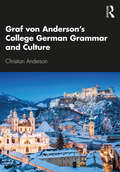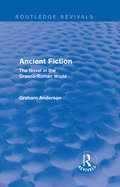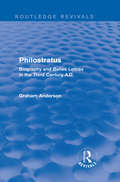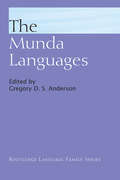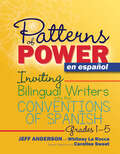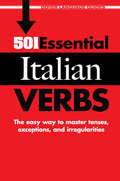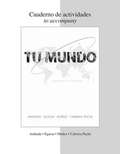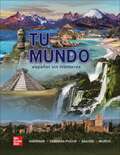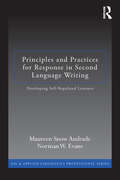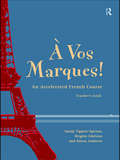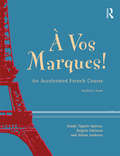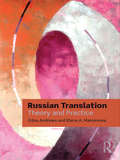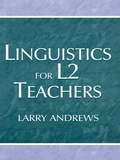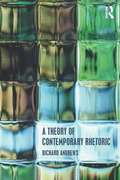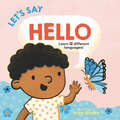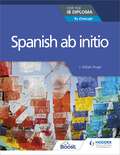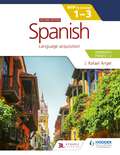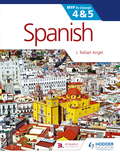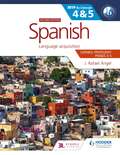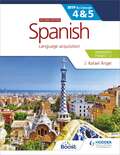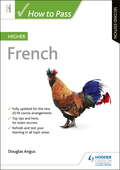- Table View
- List View
Graf von Anderson's College German Grammar and Culture
by Christian AndersonGraf von Anderson’s College German Grammar and Culture is a beginners’ textbook (CEFR A1-B2, ACTFL novice low – intermediate low) for the German language for college students and for those engaged in self-study with popular software programs and apps. In addition to illuminating profiles of key places and individuals who helped shape German history from Roman times to the present day, the textbook also includes important cultural briefings. Chapter by chapter the book delineates the scope of the German language, beginning with “ich”, and moving on to subjects and verbs. Later chapters introduce cases, indirect and direct objects, prepositions, tenses, moods, and adjectives. Each chapter includes challenging exercises, and an answer key is provided. The rich cultural component in each chapter includes a travel guide, a historical snapshot, several musical selections, and a German text to read. This book is a straightforward and thorough introduction to the basic structures of German grammar and provides an overview of selected highlights of German culture to engage and enthuse.
Ancient Fiction: The Novel in the Graeco-Roman World (Routledge Revivals)
by Graham AndersonA number of ancient novelists were skilful storytellers and resourceful literary artists, and their works are often carefully individualised presentations of an ancient and distinguished heritage. Ancient Fiction, first published in 1984, examines the tales retold by these novelists in light of more recently discovered Near Eastern texts, and in this way offers a tentative solution to Rohde’s celebrated problem about the origins of the Greek novel. Among the surprises that emerge are an ancient stratum of the Arabian Nights and a possible Tristan-Romance, as well as an animal Satyricon and a human Golden Ass. This new framework is, however, incidental to an examination of the achievements of ancient novelists in their own right. In presenting character, structuring narrative, imposing a veneer of sophistication or contriving a religious ethos, these writers demonstrate that their work is worthy of sympathetic study, rather dismissal as the pulp fiction of the ancient world.
Philostratus: Biography and Belles Lettres in the Third Century A.D. (Routledge Revivals)
by Graham AndersonThis study of Philostratus , first published in 1986, presents the Greek biographer’s treatment of both sophists and holy men in the social and intellectual life of the early Roman Empire, which also displays his own distinctive literary personality as a superficial dilettante and an engrossing snob. Through him we gain a glimpse of the rhetorical schools and their rivalries, as well as a bizarre portrayal of the celebrated first-century holy man Apollonius of Tyana, long loathed by his later Christian press as a Pagan Christ. Rarely does a biographer’s reputation revolve round the charge that he forged his principal source. Graham Anderson’s account produces new evidence which supports Philostratus’ credibility, but it also extends the charges of ignorance and bias in his handling of fellow-sophists. Philostratus is intended for any reader interested in the social, cultural and literary history of the Roman Empire as well as the professional classicist.
The Munda Languages (Routledge Language Family Series)
by Gregory D.S. AndersonThe Munda group of languages of the Austroasiatic family are spoken within central and eastern India by almost ten million people. To date, they are the least well-known and least documented languages of the Indian subcontinent. This unprecedented and original work draws together a distinguished group of international experts in the field of Munda language research and presents current assessments of a wide range of typological and comparative-historical issues, providing agendas for future research. Representing the current state of Munda Linguistics, this volume provides detailed descriptions of almost all of the languages in the family, in addition to a brief chapter discussing the enigmatic Nihali language.
Patterns of Power en español, Grades 1-5: Inviting Bilingual Writers into the Conventions of Spanish (Patterns of Power)
by Jeff Anderson Whitney La Rocca Caroline SweetAuthor Jeff Anderson and bilingual teacher and coach Caroline Sweet lead a vibrant approach to grammar instruction in Patterns of Power en español, Grades 1-5: Inviting Bilingual Writers into the Conventions of Spanish. Here, young, emergent writers are invited to notice the conventions of the Spanish language and build off them in this inquiry-based approach to instructional grammar. The book comes with standards-aligned lessons that can be incorporated in just 10 minutes a day. Patterns of Power’s responsive, invitational approach puts students in an involved role and has them explore and discuss the purpose and meaning of what they read. Students study short, authentic texts and are asked to share their findings out loud, engaging in rich conversations to make meaning. Inside you’ll find: Ready-to-use lesson plan sets that include excerpts from authentic and diverse Spanish mentor texts curated for grades 1-5 and can be adapted over 5 grade levels Real-life classroom examples, tips, and Power Notes gleaned from the authors’ experiences that can be applied to any level of writer Resources, including a Patterns of Power Planning Guide adapted for Spanish, to use in classroom instruction or as handouts for student literacy notebooks How to correlate to Spanish TEKS, Common Core, and other state standards Patterns of Power en español, Grades 1-5 provides a simple classroom routine that is structured in length and approach, but provides teachers flexibility in choosing the texts, allowing for numerous, diverse voices in the classroom. The practice helps students build cognitive recognition and provides a formative assessment for teachers on student progress. With these short lessons, students will gain confidence and move beyond limitation to produce effortless writing in your class and beyond. The Patterns of Power series also includes Patterns of Power, Grades 6-8: Inviting Adolescent Writers into the Conventions of Language; Patterns of Power, Grades 1-5: Inviting Young Writers into the Conventions of Language; Patterns of Power, Grades 9-12: Teaching Grammar Through Reading and Writing; and Patterns of Wonder, Grades PreK-1: Inviting Emergent Writers to Play with the Conventions of Language.
501 Essential Italian Verbs (Dover Language Guides Italian)
by Loredana Anderson-TirroKnowing how to conjugate verbs is a key to learning any language. This compilation of more than 500 common verbs will help instruct beginners and advanced students. Each page focuses on an individual verb, presenting full conjugations of simple and compound tenses. In addition, several sample sentences illustrate the verb's usage.
Workbook Lab Manual: Tu Mundo Actividades
by Magdalena Andrade Jeanne Egasse Elías Miguel Muñoz María Cabrera-PucheThe Cuaderno de actividades (Workbook/Laboratory Manual) to accompany Tu mundo links culture to the main text and to students' lives.
Tu mundo
by Magdalena Andrade Jeanne Egasse Elías Miguel Muñoz María José Cabrera-PucheTu mundo immerses the Introductory Spanish classroom in a culturally rich world full of opportunities to discover and explore the powerful connections between language and culture. Instructors are provided user-friendly resources to guide students as they dive into intensive communicative practice, building confidence in their ability to interact in meaningful ways in Spanish. Instructors are also provided with the tools to build a sense of community in face-to-face, hybrid, and online classes, resulting in a unique personal experience that evolves organically and sparks a natural curiosity about their world. The hallmarks of Tu mundo are: Communicative and Flexible: Tu mundo is designed to work well with a variety of communicative approaches. The goal is to provide an ideal environment where acquisition can take place, without fear of making mistakes. By jumping directly into communicative practice, students immerse themselves in the experience of active learning. This involves preparing at home using a variety of learning resources, prepping the necessary vocabulary and grammar in advance, and then coming to class ready to engage in conversation. Consistency and Performance: Tu mundo offers a dynamic adaptive learning tool called Adaptive Learning Assignments that focus students on the grammar and vocabulary they haven’t yet mastered, filling the gaps to prepare them for in-class communication. Community and Connections: Whether in a physical classroom or in an online course via Connect Spanish, students are provided with opportunities to engage in meaningful conversations and collaborative task-based activities that enable students to practice their language skills making connections and understanding the Hispanic world. Meaningful and real-life experience: Culture is often left behind - so Tu mundo offers it throughout. Each chapter features a country of focus, which doubles as the home country of one of the fifteen amigos. In addition to the in-chapter cultural sections, every chapter of Tu mundo features a second video segment called Mi país, narrated by the amigos themselves as they share information about their native countries. This window into the lives of the amigos provides a point of comparison in which students can interact with language and culture in a meaningful way.
Principles and Practices for Response in Second Language Writing: Developing Self-Regulated Learners (ESL & Applied Linguistics Professional Series)
by Maureen Snow Andrade Norman W. EvansBased on the assumptions that students expect feedback and want to improve, and that improvement is possible, this book introduces a framework that applies the theory of self-regulated learning to guide second language writing teachers’ response to learners at all stages of the writing process. This approach provides teachers with principles and activities for helping students to take more responsibility for their own learning. By using self-regulated learning strategies, students can increase their independence from the teacher, improve their writing skills, and continue to make progress once the course ends, with or without teacher guidance. The book focuses on the six dimensions of self-regulated learning —motive, methods of learning, time, physical environment, social environment, and performance. Each chapter offers practical activities and suggestions for implementing the principles and guidelines, including tools and materials that teachers can immediately use.
A Vos Marques!: Teacher's Book
by Alison Andrews Brigette Edelston Sandy Tippett-SpirtouThis Teachers' book is designed to accompany the A Vos Marques student's book, an introductory French course designed specifically for false beginners.
A Vos Marques!: An Accelerated French Course: Student's Book
by Alison Andrews Brigette Edelston Sandy Tippett-SpirtouA Vos Marques! is an introductory course for students taking French as an option alongside their main degree course. It has been developed specifically for false beginners: students who have a slight acquaintance with the language.The course comprises a student's book, teacher's book and 180 minutes of audio (available for free download at http://www.routledge.com/books/details/9780415157285/ ) and, through fifteen chapters, follows the progress of an English-speaking student studying in Paris, whose achievements are designed to reflect those of the course user.Special features include:* activities involving pair and group work* an aid to self-assessment at the end of each chapter* hints on vocabulary learning* clear and accessible layout including integrated cartoons.The guidance offered by the teachers book is of particular importance, as lower-level classes in universities are often taught by native-speaking lecturers with little or no teaching training or experience.
Russian Translation: Theory and Practice
by Edna Andrews Elena MaksimovaRussian Translation: Theory and Practice is a comprehensive practical course in translation for advanced undergraduate and postgraduate students of Russian. The course aims to provide intensive exposure with a view to mastering translation from Russian into English while carefully analyzing the specific problems that arise in the translation process. Offering over 75 practical translation exercises and texts analyzed in detail to illustrate the stage-by-stage presentation of the method, Russian Translation addresses translation issues such as cultural differences, genre and translation goals. The book features material taken from a wide range of sources, including: journalistic medical scholarly legal economic popular culture – literature (prose and poetry), media, internet, humour, music. Central grammatical and lexical topics that will be addressed across the volume through the source texts and target texts include: declensional and agreement gender; case usage; impersonal constructions; verbal aspect; verbal government; word order; Russian word formation, especially prefixation and suffixation; collocations and proverbs; and abbreviations. Russian Translation: Theory and Practice is essential reading for all students seriously interested in improving their translation skills. A Tutor’s Handbook for this course, giving guidance on teaching methods and assessment, as well as specimen answers, is available in PDF format from our website at http://www.routledge.com/books/Russian-Translation-isbn9780415473477. Edna Andrews is Professor of Linguistics and Cultural Anthropology, Director of the Center for Slavic, Eurasian and East European Studies at Duke University, USA. Elena Maksimova is Associate Professor of the Practice in the Department of Slavic and Eurasian Studies at Duke University, USA.
Linguistics for L2 Teachers
by Larry AndrewsLinguistics for L2 Teachers is designed to help bilingual and ESL teachers better understand how and why the English language works, and to broaden their abilities to help their students learn about the various functions of English in the real world. It is not a complete curriculum in English linguistics, but rather, a foundation from which teachers can continue to grow and to teach with greater confidence. The reader-friendly, conversational style makes the concepts easily accessible to preservice and in-service teachers who have little or no previous experience in language study. This textbook: * explains various aspects of English using non-technical terminology; * goes beyond the study of grammar to examine the functions of language, not just its form; * presents language applications in L2 classrooms; and * clearly delineates the significance of chapter topics for L2 teachers and students. Each chapter includes prereading activities to enhance the reader's comprehension; postreading activities to expand and elaborate the concepts; and interactive "Be A Linguist" activities to help readers think in ways similar to the ways linguists think and to provide opportunities to apply ideas explained within the chapter. Intended for all teachers of students for whom English is a new language, this text will help them be better prepared to meet the important challenges and questions they encounter in their classrooms.
A Theory of Contemporary Rhetoric
by Richard AndrewsA Theory of Contemporary Rhetoric describes, explains, and argues the overarching theory of contemporary rhetoric. This current view of rhetoric brings together themes in the communication arts, including political literary criticism; bi- and multi-lingualism; multimodality; framing as an artistic and sociological device for composition and interpretation; literacy in the digital age; and the division between fiction and ‘non-fiction’ in language/literature studies. Chapters explore the implications of rhetoric for particular aspects of the field. Discussions throughout the book provide illustrations that ground the material in practice. As an overarching theory in the communication arts, rhetoric is elegant as a theoretical solution and simple as a practical one. It asks such questions as who is speaking/writing/composing? to whom? why? what is being conveyed? and how is it being conveyed? Acknowledging the dirth of recent works addressing the theory of rhetoric, this book aims to fill the existing theoretical gap and at the same time move the field of language/literature studies forward into new territory. It provides the keynote theoretical guide for a generation of teachers, teacher educators and researchers in the fields of English as a subject; English as a second, foreign or additional language; and language study in general.
Let's Say Hello (Baby's First Language Book)
by Giselle AngTeach babies to greet others in twelve different languages with this adorable multilingual board book! Get ready, everyone! LET’S SAY...HELLO. A perfect companion to Disney’s "It's a Small World" and Shirley Ng-Benitez’s How Do You Say series, Let’s Say board books teach tiny tots warm and friendly words/phrases in several languages. Each book features: twelve diverse languages: American Sign Language, Arabic, French, German, Haitian Creole, Hausa, Hindi, Italian, Japanese, Mandarin Chinese, Russian, Spanish vibrant and colorful illustrations easy-to-read pronunciations/demonstrations kid-friendly illustrations of everyday babies from around the world An ideal baby shower or first-day-of-school gift!
Spanish ab initio for the IB Diploma: by Concept
by J. Rafael AngelEnsure that the needs of all IB Students are met with this comprehensive and flexible Student Book, written specifically for the updated Spanish ab initio course. - Communicate confidently by exploring the five prescribed themes through authentic texts and skills practice at the right level, delivered in clear learning pathways. - Produce coherent written texts and deliver proficient presentations with grammar and vocabulary introduced in context and in relation to appropriate spoken and written registers. - Improve receptive skills with authentic written texts, audio recordings spoken at a natural pace, and carefully crafted reading and listening tasks.- Promote global citizenship, intercultural understanding and an appreciation of Hispanic cultures through a wide range of text types and cultural material from around the world. - Deliver effective practice with a range of structured tasks within each unit that build reading, listening, speaking and writing skills.- Establish meaningful links to TOK and CAS, and identify learner profile attributes in action.The audio for the Student Book is FREE to download from www.hoddereducation.com/ibextrasAnswers to the Student Book are included in the accompanying subscription based, Teaching and Learning Resources
Spanish ab initio for the IB Diploma: by Concept
by J. Rafael AngelEnsure that the needs of all IB Students are met with this comprehensive and flexible Student Book, written specifically for the updated Spanish ab initio course. - Communicate confidently by exploring the five prescribed themes through authentic texts and skills practice at the right level, delivered in clear learning pathways. - Produce coherent written texts and deliver proficient presentations with grammar and vocabulary introduced in context and in relation to appropriate spoken and written registers. - Improve receptive skills with authentic written texts, audio recordings spoken at a natural pace, and carefully crafted reading and listening tasks.- Promote global citizenship, intercultural understanding and an appreciation of Hispanic cultures through a wide range of text types and cultural material from around the world. - Deliver effective practice with a range of structured tasks within each unit that build reading, listening, speaking and writing skills.- Establish meaningful links to TOK and CAS, and identify learner profile attributes in action.The audio for the Student Book is FREE to download from www.hoddereducation.com/ibextrasAnswers to the Student Book are included in the accompanying subscription based, Teaching and Learning Resources
Spanish for the IB MYP 1-3 (Emergent/Phases 1-2) (Emergent/Phases 1-2) (Emergent/Phases 1-2) (Emergent/Phases 1-2): MYP by Concept Second edition: By Concept
by J. Rafael AngelDevelop your skills to become an inquiring learner; ensure you navigate the MYP framework with confidence using a concept-driven and assessment-focused approach to Spanish, presented in global contexts.- Develop conceptual understanding with key MYP concepts and related concepts at the heart of each chapter. - Learn by asking questions for a statement of inquiry in each chapter. - Prepare for every aspect of assessment using support and tasks designed by experienced educators.- Understand how to extend your learning through research projects and interdisciplinary opportunities.- Think internationally with chapters and concepts set in global contexts.
Spanish for the IB MYP 1-3 (Emergent/Phases 1-2) (Emergent/Phases 1-2) (Emergent/Phases 1-2) (Emergent/Phases 1-2): MYP by Concept Second edition: By Concept
by J. Rafael AngelDevelop your skills to become an inquiring learner; ensure you navigate the MYP framework with confidence using a concept-driven and assessment-focused approach to Spanish, presented in global contexts.- Develop conceptual understanding with key MYP concepts and related concepts at the heart of each chapter. - Learn by asking questions for a statement of inquiry in each chapter. - Prepare for every aspect of assessment using support and tasks designed by experienced educators.- Understand how to extend your learning through research projects and interdisciplinary opportunities.- Think internationally with chapters and concepts set in global contexts.
Spanish for the IB MYP 4 & 5
by J. Rafael AngelWe are working with the IB to gain endorsement for the MYP by Concept series.Drive meaningful inquiry for the new framework through a unique concept driven narrative.- Supports every aspect of assessment with opportunities that use the criteria- Gives you easy ways to differentiate and extend learning- Provides a meaningful approach by integrating the inquiry statement in a global context- Develops critical-thinking skills with activities and summative sections rooted in the ATL frameworkAlso coming soon are Teaching and Learning Resources and eTextbooks via Dynamic Learning, our complete digital solution.
Spanish for the IB MYP 4&5 (Capable-Proficient/Phases 3-4, 5-6) (Capable-Proficient/Phases 3-4, 5-6) (Capable-Proficient/Phases 3-4, 5-6) (Capable-Proficient/Phases 3-4, 5-6) (Capable-Proficient/Phases 3-4, 5-6) (Capable-Proficient/Phases 3-4, 5-6) (Capable-Proficient/Phases 3-4, 5-6) (Capable-Proficient/Phases 3-4, 5-6): MYP by Concept Second edition: By Concept
by J. Rafael AngelDevelop your skills to become an inquiring learner; ensure you navigate the MYP framework with confidence using a concept-driven and assessment-focused approach to Spanish, presented in global contexts.- Develop conceptual understanding with key MYP concepts and related concepts at the heart of each chapter. - Learn by asking questions for a statement of inquiry in each chapter. - Prepare for every aspect of assessment using support and tasks designed by experienced educators.- Understand how to extend your learning through research projects and interdisciplinary opportunities.- Think internationally with chapters and concepts set in global contexts.
Spanish for the IB MYP 4&5 (Capable-Proficient/Phases 3-4, 5-6) (Capable-Proficient/Phases 3-4, 5-6) (Capable-Proficient/Phases 3-4, 5-6) (Capable-Proficient/Phases 3-4, 5-6): MYP by Concept Second Edition: By Concept
by J. Rafael AngelDevelop your skills to become an inquiring learner; ensure you navigate the MYP framework with confidence using a concept-driven and assessment-focused approach to Spanish, presented in global contexts.- Develop conceptual understanding with key MYP concepts and related concepts at the heart of each chapter. - Learn by asking questions for a statement of inquiry in each chapter. - Prepare for every aspect of assessment using support and tasks designed by experienced educators.- Understand how to extend your learning through research projects and interdisciplinary opportunities.- Think internationally with chapters and concepts set in global contexts.
Spanish for the IB MYP 4&5 (Emergent/Phases 1-2) (Emergent/Phases 1-2) (Emergent/Phases 1-2) (Emergent/Phases 1-2) (Emergent/Phases 1-2) (Emergent/Phases 1-2) (Emergent/Phases 1-2) (Emergent/Phases 1-2): MYP by Concept Second edition: By Concept
by J. Rafael AngelDevelop your skills to become an inquiring learner; ensure you navigate the MYP framework with confidence using a concept-driven and assessment-focused approach to Spanish, presented in global contexts.- Develop conceptual understanding with key MYP concepts and related concepts at the heart of each chapter. - Learn by asking questions for a statement of inquiry in each chapter. - Prepare for every aspect of assessment using support and tasks designed by experienced educators.- Understand how to extend your learning through research projects and interdisciplinary opportunities.- Think internationally with chapters and concepts set in global contexts.
Spanish for the IB MYP 4&5 (Emergent/Phases 1-2) (Emergent/Phases 1-2) (Emergent/Phases 1-2) (Emergent/Phases 1-2) (Emergent/Phases 1-2) (Emergent/Phases 1-2) (Emergent/Phases 1-2) (Emergent/Phases 1-2): MYP by Concept Second edition: By Concept
by J. Rafael AngelDevelop your skills to become an inquiring learner; ensure you navigate the MYP framework with confidence using a concept-driven and assessment-focused approach to (insert subject), presented in global contexts.- Develop conceptual understanding with key MYP concepts and related concepts at the heart of each chapter. - Learn by asking questions for a statement of inquiry in each chapter. - Prepare for every aspect of assessment using support and tasks designed by experienced educators.- Understand how to extend your learning through research projects and interdisciplinary opportunities.- Think internationally with chapters and concepts set in global contexts.
How to Pass Higher French: Second Edition Epub
by Douglas AngusExam Board: SQA Level: Higher Subject: French First Teaching: August 2018 First Exam: May 2019Get your best grade with comprehensive course notes and advice from Scotland's top experts, fully updated for the latest changes to SQA Higher assessment. How to Pass Higher French Second Edition contains all the advice and support you need to revise successfully for your Higher exam. It combines an overview of the course syllabus with advice from a top expert on how to improve exam performance, so you have the best chance of success.- Revise confidently with up-to-date guidance tailored to the latest SQA assessment changes - Refresh your knowledge with comprehensive, tailored subject notes- Prepare for the exam with top tips and hints on revision techniques- Get your best grade with advice on how to gain those vital extra marks
